



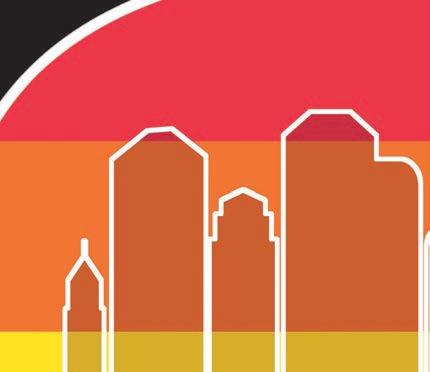

































AMANDA WALTZ








































































AMANDA WALTZ

































Tucked tightly beneath the concrete arch bridge carrying Ohio River Boulevard over Woods Run is a four-story building with strong ties to LGBTQ+ history.
Between 1993 and 2012, nightclub entrepreneur extraordinaire Scott Noxon operated it as the Pittsburgh Eagle. Like the bridge that dwarfs it, the brick building towers over Eckert Street and Don’s Diner, the popular eatery located across the road. And like Donny’s Place in Polish Hill and the True Luck Café (Lucky’s) in the Strip District, the Eagle occupied a building with its own deep and fascinating history, begining with an Irish saloonkeeper who bankrupted himself constructing the building, and ending with a key chapter in the city’s history of queer nightlife entertainment.
BY: DAVID S. ROTENSTEIN

The building at 1740 Eckert St. was one of two brick buildings Robert L. Matthews had constructed between 1902 and 1906. The first was a store designed by architect Frederick Scheibler, and the second was a saloon and hotel that became the Pittsburgh Eagle. According to a biography of the architect, who later became known for designing many distinctive homes and apartment buildings, the store was his second professional commission.
The Pennsylvania-born son of an Irish immigrant who worked as a shoemaker, Matthews, by the 1890s, had traded working as a railroad brakeman for a career in hospitality. He got his first saloon license in 1895 and he began buying lots along McClure Avenue.
Matthews was 46 in 1904 when he married Catherine Reel, the daughter of a wealthy Allegheny County family whose ancestors include early settler Casper Reel.
The Scheibler-designed Matthews saloon and hotel was a neoclassical architectural gem. Its Eckert Street façade includes two massive pilasters and a cartouche with Matthews' initials. The brick building featured a Scheibler design hallmark: a steel frame. It was built to last and make a statement about its owner’s wealth.
$1,275 ($46,000), and the basement power plant to light the building included a gas-powered generator that cost $2,500 ($92,000).

Matthews had sunk more than $10,000 ($363,000) in fixtures and lighting alone. He had $46,000 ($1.6 million) in secured debts and owed individuals $3,847 ($139,803) for outstanding loans and work on the building. His biggest creditor was former congressman and pioneering nature photographer George Shiras 3rd [sic], whom Matthews owed $1,120 ($40,701). When he filed for bankruptcy, Matthews had assets worth just $255 ($9,266): four suits, one overcoat, one ring, one watch and chain, and $255 in cash.

Like many other Pittsburgh hospitality entrepreneurs, Matthews left a complicated legacy. The saloon and hotel failed in 1907. Despite his in-laws' wealth, Matthews had borrowed heavily, presumably to finance the building and create a luxurious drinking establishment.

“They were A #1 bar fixtures,” Matthews told a federal bankruptcy judge in 1908. He had paid $4,000 ($145,000 in 2025) for a mahogany, glass, and marble bar, and sideboard. The 18-room building had 26 chandeliers that cost him



“TO HAVE A PHYSICAL REMNANT LEFT OF ITSELF, IT’S ONE OF VERY, VERY FEW PLACES.”




After losing the saloon and his shirt, Matthews and his wife opened a Ross Township roadhouse called The Oaks. Because of the bankruptcy, the property was in Catherine Matthews’ name, and Robert Matthews owned the saloon license. Scheibler designed a new building for Catherine, yet a different one ultimately was constructed.




The Matthews marriage began to disintegrate after they opened the roadhouse, and, in 1913, Catherine filed for divorce. Their split was anything but conventional. obert Matthews, according to the divorce case record, “drank a great deal and was ill natured, unreasonable he habitually insulted guests at the hotel made improper advances towards them and at times exposed his person before them, greatly mortifying his wife.”


As the divorce case moved forward, ittsburgh newspapers reported that obert Matthews had sued Catherine s sister, Stella eel. As the Pittsburgh Press reported, Matthews “[declared] that his wife s sister persuaded her to desert him and to apply for a divorce.” obert Matthews also alleged that his sister-in-law had gotten free room and board at the roadhouse in the months leading up to the divorce and he demanded $10,000 in damages.


“HE HABITUALLY INSULTED GUESTS AT THE HOTEL; MADE IMPROPER ADVANCES TOWARDS THEM AND AT TIMES EXPOSED HIS PERSON.”










obert lived the remainder of his life in poverty he died in 1934, a resident of the orth Side ittle Sisters of the oor home for the elderly. Catherine Matthews owned and operated The aks until 1937 she died in 1952. Curiously, despite their contentious and very public divorce, Catherine and obert are buried in the same plot in Christ ur edeemer Cemetery in oss Township.
ack in Woods un, a new saloon keeper took over the building and, in 1921, the krainian-Americani ation Association bought it and converted it into a clubhouse. y the 1930s, it had become known as ckert Hall. Tenants included two candy companies.
n 1942, the building changed hands again and became a olish social club: the a imier a ulaskiego Sick enefit Association (later renamed the a imier ulaski Society). As a private social club, the ulaski society followed a familiar trajectory because of its li uor license: beneficial community social events coupled with multiple law enforcement raids, mostly for sales to non-members.
Scott oxon repeated an old pattern when he bought 1740 ckert St. in 1993. The city s ueer spaces tended to be located in older, converted buildings. thnic social clubs were popular choices. n many cases, wrote ittsburgh ueer History roject founder Harrison Apple, the buildings and fixtures came with li uor licenses for sale.
Adapting older buildings was a pattern among historically marginali ed people in the city, including immigrant and lack residents. “ one of the establishments was found located in any recently built building,”


















wrote University of Pittsburgh graduate student William Y. Bell Jr. in a 1938 master’s thesis about the city’s Black recreational businesses.
The ittsburgh agle was oxon s first bar in an older building with a colorful history. Noxon used a popular name for the Woods Run nightclub — there were other Eagle gay bars throughout the country, in New York, Washington, San Francisco, Philadelphia, and Baltimore, according to a 2017 NBC News report.
A little more than a decade after opening the Eagle, Noxon bought Pegasus at 818 Liberty Ave. in 2005. In 2009, Noxon told Pittsburgh City Paper that, in 1984, he came out at Pegasus, and that he had fond memories of the place.
Pegasus was a space that, since the 1940s, had been home to nightclubs owned and frequented by Jewish racketeers. The basement










nightclub’s best-known tenant was Lenny Litman’s Copa, which was open between 1948 and 1959.
Lenny Litman was one of three brothers who ran a variety of illegal enterprises. The middle brother and most public facing, for many years Lenny penned entertainment and society columns for local newspapers. His older brother Raymond “Archie” was a boxing promoter and beer distributor. Younger brother Eugene was also in the beer business and real estate.
“Lenny was the front,” explains one close family associate who asked to remain anonymous because he was discussing criminal activities. “He was the front for Archie and Eugene.” As for Eugene, the associate described him as Pittsburgh’s Jewish Godfather.
Pegasus became a hub of Pittsburgh queer life, hosting fundraisers and benefits for a variety of T causes. n 1998, the Post-Gazette dubbed Pegasus “Pittsburgh’s most visible gay bar.” Like its predecessor the Copa — which, according to Apple, in 1954 hosted pioneering trans performer Christine Jorgensen’s nightclub debut — Pegasus had become a safe place for marginalized and socially stigmatized people.
t was a fun and safe place for ittsburgh s gay men. et, times were changing by the time Noxon bought Pegasus. Gay men had more socializing and nightlife options because of cultural shifts, and the costs of running a downtown club had gotten too expensive.
Under Noxon’s ownership, Pegasus and The Eagle overlapped for four years before Noxon decided to leave Liberty Avenue and fold Pegasus into The Eagle building. Each bar had its own demographic and patron preferences. Young gay men were the core group at Pegasus, and the Eagle catered to a more mature crowd, Noxon told the Post-Gazette in 2015, three years after he closed the Woods Run bar in 2012.
Noxon sold the property in 2017. City Paper reached out to him about its history. He shared a few details about the architecture, but he declined to answer any uestions. “ am not saying much to any of the press about anything with buildings,” Noxon texted. “The Donnies bar [Donny’s Place] thing is just sad.”
The exchange with Noxon occurred a few days after the Historic Review Commission declined to vote on whether it should recommend the former Donny’s Place building in Polish Hill as a City of Pittsburgh historic landmark.
HRC members claimed they didn’t have enough information about how onny s lace fit into the history of ittsburgh s T culture and history. However, the information about Donny’s Place and others, like The Eagle, is documented. Apple wrote about the bars and their buildings, including The Eagle, Donny’s Place, Pegasus, and many other bars in their 2021 University of Arizona Ph.D. dissertation, “A Social Member in Good Standing: Pittsburgh’s Gay After-Hours Social Clubs, 1960-1990.”
“ n terms of T history in ittsburgh, it is one of the longerrunning historically central institutions,” Apple says of Donny’s Place. “To have a physical remnant left of itself, it’s one of very, very few places of similar ilk like Pegasus and the Eagle.” •

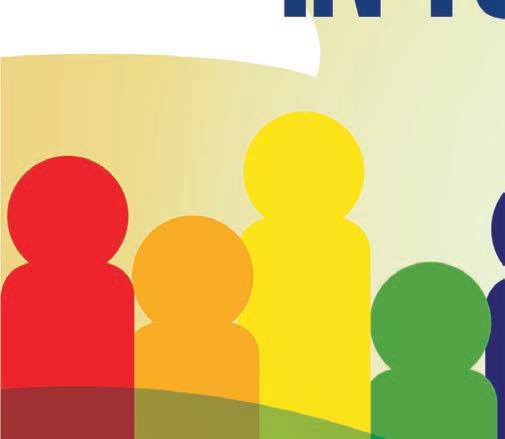







Ballroom has grown in Pittsburgh, and with it, an understanding of the scene’s artistry and sense of community
BY: AMANDA WALTZ // AWALTZ@PGHCITYPAPER.COM
t all started with the Harlem Renaissance — at least, that’s what the National Museum of African American History and Culture in Washington, D.C., says about vogue and ballroom. As the Museum points out, between 1920 and 1935, the Harlem Renaissance saw Black intellectuals, authors, artists, and musicians ourish. Many of these figures were openly gay or ueer and in uenced what would become a starting point for this aspect of LGBTQ culture.
“PEOPLE COME INTO BALLROOM BECAUSE THEY’RE TRYING TO ESCAPE SOMETHING.”












Voguing, defined by the museum as a “highly stylized form of dance created by [Black] and Latino LGBTQ communities,” emerged between the 1960s and ’80s in the New York City drag scene. Queens would compete in what were known as balls, characterized by runway-style fashion shows, complex dance moves, and plays on gender and sexuality.
The influential 1990 documentary Paris Is Burning captured New York’s ballroom scene and, to some degree, introduced it to the mainstream. Then came Madonna, her hit house song “Vogue,” and her hiring of ballroom dancers (including Jose Gutierez Xtravaganza, who appeared in Paris Is Burning) for her Blond Ambition World Tour.
While ballroom has become more visible over the last few decades, especially with the popularity of the long-running hit series RuPaul’s Drag Race, it has been slow to reach Pittsburgh. Or, at least, it seems that way, as, only recently, efforts like the Pittsburgh Queer History Project have worked to preserve and make known the city’s LGBTQ past.
Those outside Pittsburgh’s ballroom circle can see glimpses of it in the wild. Local queer dance parties like Cherry Bomb feature ballroom dancers showing off for crowds, and area LGBTQ nonprofits True T offers and QMNTY Center hosts workshops and practice sessions for experienced and aspiring vogue practitioners.
Ballroom, like any subculture, has distinct lingo, standards, and hierarchical structures cultivated over decades. And while balls are often aligned with beauty pageants, local ballroom dancer Hazell Azzer views the scene more as a sport with specially skilled athletes than as an underground Miss America.
“I try to explain to people, these are sports realistically, because we have to train to vogue,” Azzer tells Pittsburgh City Paper.




Watch any ball footage, and the observation makes sense — dancers execute risky, often gymnastic moves, doing splits, crashing their bodies to the ground during dramatic drops, and testing the stretch of their thigh muscles as they squat into deep duckwalks.
Azzer, voted Best Voguer in the 2024 City Paper Readers Poll, became interested in ballroom as a young teen and marvels at how much the scene has grown.
“I didn’t think, way back in middle school, that I would be traveling continent to continent competing in ballroom,” says Azzer, who has vogued in places such as Paris, Jamaica, and the Dominican Republic.
Azzer competes as part of the Pittsburgh chapter of the House of Revlon and explains how houses, defined as a “group or conglomerate of people that operate as a sorority, fraternity, or organization,” are an integral part of ballroom. Azzer says, typically, houses have a mother, father, prince, princess, and other members (Azzer serves as the mother of the Pittsburgh House of Revlon). Houses distinguish themselves with special chants or “battle cries” heard at balls.
Azzer says that, while ballroom has grown worldwide, the scene in Pittsburgh remains small, mostly due to the city’s relatively small population. Azzer estimates that the city has around 100 ballroom dancers compared to thousands in major metropolises like New York City.
While Azzer says being smaller makes Pittsburgh’s ballroom scene more “intimate,” it can also lead to fiercer competition in local balls.
“It’s like crabs in a barrel; they’re all squeezing for the same moment,” says Azzer.
Azzer says anyone interested in ballroom should immerse themselves in its culture and history, learn from ballroom elders, and familiarize themselves with localized scenes, stressing that ballroom looks different in every city. Azzer also emphasizes the importance of community in ballroom, as the scene often attracts marginalized groups facing discrimination and alienation.

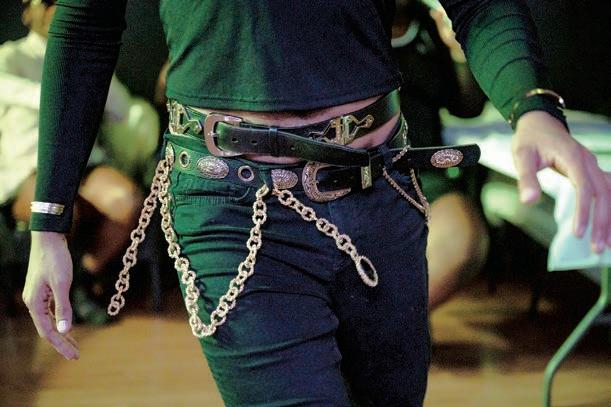





“People come into ballroom because they’re trying to escape something,” says Azzer. “So that could be escaping reality, escaping unemployment, escaping homelessness, escaping hunger — maybe you could be a resource for a person that gets them off the street, or put hope back in their life.”
Azzer expands on this, saying ballroom has deep ties with health care nonprofit organizations because “there were a lot of people in the scene who needed help.” Azzer exemplifies this as the community outreach and engagement coordinator for AIDS Free Pittsburgh, described as a “collaborative initiative comprised of government agencies, healthcare institutions, and communitybased organizations that strive to support and improve the care of people living with HIV/AIDS, as well as communities most at-risk for HIV.”
Azzer says that, even if someone finds themselves unsuited to compete in balls, they can still support ballroom in other ways.
“Not everybody is meant for ballroom, just like everyone isn’t meant for every sport,” Azzer says. “But everyone can watch it and appreciate it, everyone can understand the basics and fundamentals. But you’ll never truly understand a sport or a culture until you fully submerge yourself in it.” •





With Pride approaching and DEI being rolled back by companies nationwide, Pittsburgh’s LGBTQ advocates speak out
BY: KATY FLEMING


As Pride Month begins, Pittsburgh prepares to celebrate — but this year’s festivities arrive amid a nationwide wave of political and corporate rollbacks threatening LGBTQ rights and visibility. While some brands retreat, local leaders and advocates are doubling down, determined to make Pride more meaningful than ever.
Several of U.S. President Donald Trump’s executive orders and federal directives have rolled back previous protections by targeting Diversity, Equity, and Inclusion initiatives, gender-affirming care, and inclusive
workplace policies for LGBTQ individuals. These national shifts are reverberating locally, affecting not just policies but how institutions and communities respond.
The changes and the rhetoric surrounding them are already in uencing how institutions engage with LGBTQ communities, prompting some to withdraw while others resist. The Pittsburgh Equality Center, a long-standing LGBTQ community hub dedicated to education, advocacy, and social justice, has seen the effects firsthand.
“Political shifts and hostile rhetoric often create a chilling effect,



causing ally organizations to selfcensor or roll back DEI policies," Ray Sidney-Smith, president of the Pittsburgh Equality Center, tells Pittsburgh City Paper. "This is counterproductive because DEI isn’t about elevating one group above another — it’s about ensuring fairness and inclusion for everyone. The current climate forces us to have difficult conversations with allies and our community leaders reaffirming that this is a temporary phase and that our commitment to diversity and inclusion must remain strong.”
The chilling effect doesn t stop at government policies. Corporations — long viewed as essential Pride allies — are also scaling back. Companies like Pepsi and Nissan have withdrawn sponsorship from major Pride events, including NYC Pride. Comcast no longer supports San Francisco Pride, and Deloitte withdrew its support from WorldPride in Washington, D.C. According to Gravity Research, at least
39% of companies plan to reduce Pride-related engagement this year. n ittsburgh, the effects are just as clear. Major healthcare systems like UPMC and Allegheny Health Network have removed DEI content from their websites. Web pages containing resources addressing care for various minority groups were taken down. Additionally, multiple local universities changed their DEI-related web content following the U.S. Department of Education threatening loss of research funding if institutions didn’t comply with federal guidelines.
“The rollback of DEI policies and loss of sponsorships don t just affect one group; they signal a broader threat to all minority communities, "says Sidney-Smith. "The attack on trans people, for example, is a bellwether to broader discrimination. We must recognize these signs and work collectively to protect all vulnerable populations.”
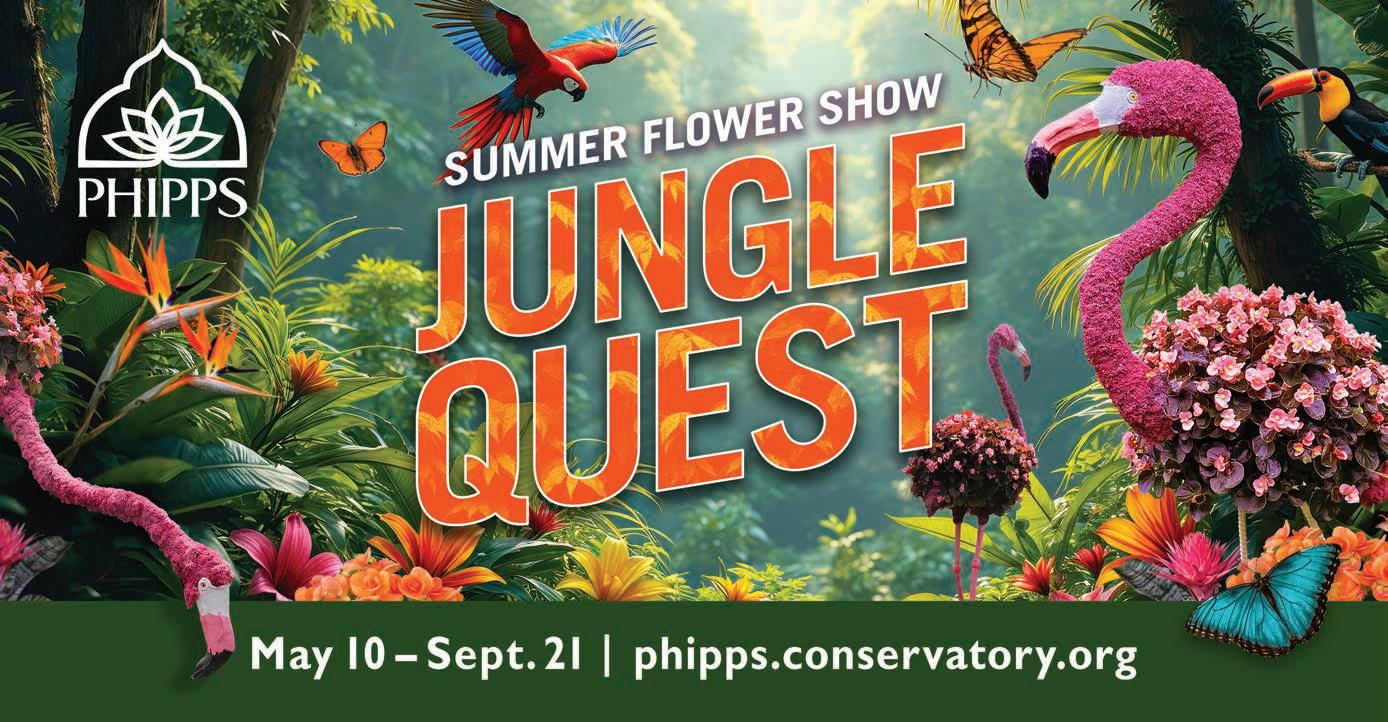
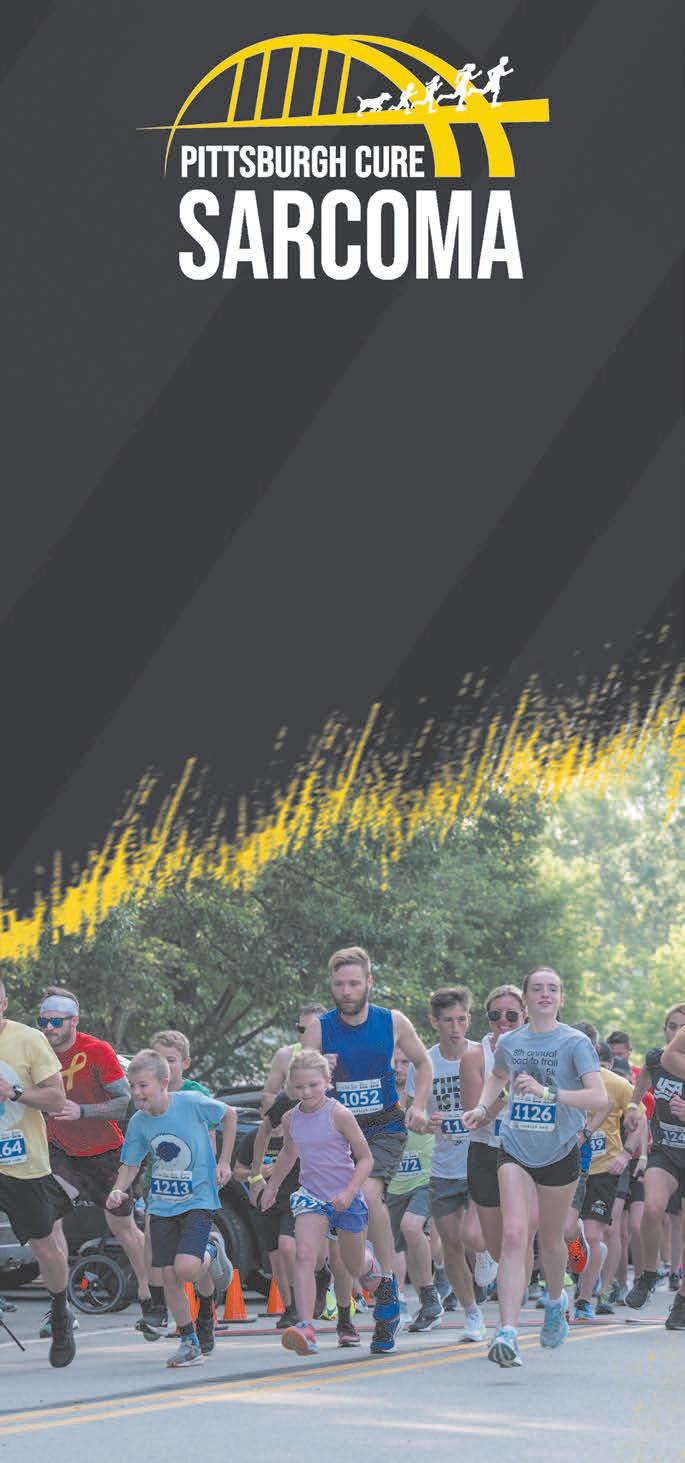


These rollbacks are also sparking public backlash. Locally and nationally, some consumers reported reducing or stopping shopping at Target stores after the company announced it would end key DEI goals and initiatives in January. In addition to Target, Amazon, Google, Meta, McDonald’s, and Walmart scaled back or eliminated their DEI programs.
Yet even as major corporations scale back, Pittsburgh’s grassroots energy and local leadership are stepping up.
Sidney-Smith urges Pittsburgh organizations to continue showing their support during Pittsburgh Pride and beyond. “Supporting marginalized communities during Pride and throughout the year is a testament to our collective commitment to equity and justice,” Sidney-Smith says. “It shows the community that we are steadfast in our support. It sends a strong message not just to LGBTQ+ individuals but to the entire community that inclusivity and solidarity are non-negotiable values.”
Pittsburgh Pride 2025 begins on
“OUR COMMUNITY HAS ALWAYS BEEN RESILIENT, ACCUSTOMED TO TAKING CARE OF OUR OWN, EVEN IN THE FACE OF ADVERSITY.”
“As the creator of All Out Music Fest and a proud LGBTQ+ business owner, I believe showing up for our community isn’t seasonal — it’s essential,” executive producer Nick Staples tells City Paper. “In a moment when so many brands are retreating from Pride or quietly pulling their support, we’re seeing that firsthand — some longtime sponsors have backed out of the festival this year. But that only strengthens our commitment. All Out was built to be a celebration by us and for us — and now more than ever, that visibility, joy, and unapologetic authenticity matters. Pride isn’t a trend. It’s a statement of belonging, and we’ll never stop making it.”
Nick Staples Presents brings another impressive line-up to Stage AE for the All Out Music Fest, a daylong concert in celebration of the LGBTQ community. Formerly known as Pride on the Shore, Galantis headlines this outdoor music festival on Fri., May 30, filled with mix of drag artists, hip-hop, electronic, and rock.
Fri., May 30 with various activities including the All Out Fest, Prom, and Emerald City Kiki Ball. The fun continues on Saturday with the annual Pittsburgh Pride March and Parade on Sun., June 1. Several surrounding Pittsburgh communities will host separate Pride events, such as Pride Millvale on June 14. Many of these celebrations are listed on Visit Pittsburgh’s website.
Despite mounting challenges, Pride in Pittsburgh stands as a testament to community, and the enduring power of showing up. Cities like Pittsburgh remind us that real allyship starts at home — and that visibility and advocacy remain as urgent as ever.
“Our community has always been resilient, accustomed to taking care of our own, even in the face of adversity,” says Sidney-Smith. “We continue our work regardless of political winds, focusing on creating a safe and equitable environment for LGBTQ+ individuals in Pittsburgh.” •






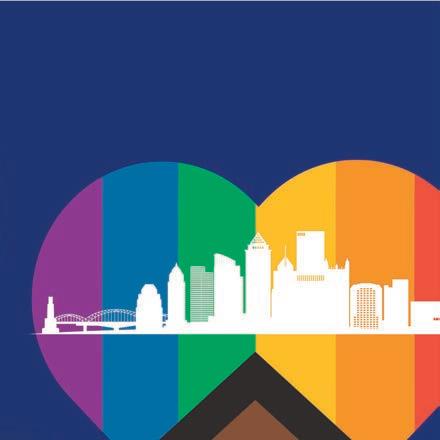



Humane Action Pennsylvania became a non-profit in 2019, four years after their founding. They recently celebrated 10 years and with it, lots of growth and success. Some of their work is policy-based, and but the majority is community-based, including lots of different programs and events to get the community active in their mission, which is to show the interconnectedness between animal issues and other pressing social issues.
A June 28 event, “Wild Neighbors Dance Benefit: A Night of Music, Movement, and Meaning” is a campaign that benefits HAP’s Love Your Wild Neighbor Campaign, an online resource that provides humane but effective ways to solve common wildlife conflicts. There is a directory and database by animal and ways to find specific issues you are dealing with and solutions to the problem.
For example, instead of calling the city to trap an animal in your attic like a squirrel, opossum or raccoon, HAP recommends soaking a few rags in ammonia and leaving them around the area for three nights in a row and leave the lights on. The animal will be driven out by the smell and the light and take any offspring with them. Once you believe the animals are gone, sprinkle flour on your attic floor to show any new tracks. If none appear, make sure to seal any holes they may have entered through.
HAP’s solutions hope to be an alternative to the city’s, who will often euthanize hundreds of animals every year at taxpayer expense.
Last year, HAP wanted to raise awareness to the campaign, so they commissioned a mural with a local muralist named Jeremy Raymer. You can find the mural on East Carson Street in the South Side. It’s a raccoon mural and the words “Love your wild neighbor” are painted across the top.
HAP’s
always felt like pigeons get a bad rap, people call them rats with wings, but they’re actually smart, tough birds that have made cities like Pittsburgh their home,” Kowalski said. “The idea of painting one on a bridge felt like the perfect way to show how connected they are to the city, and I want the mural to make people pause, maybe smile, and see pigeons a little differently—like they actually belong here just as much as we do.”
The funds from the dance benefit will go toward the next installment in the mural series. The benefit will run from 6-9 p.m. with an open bar for under $50.
In addition to their mural project, HAP has had success with legislation to help animals. They had an amendment passed to a wild bird protection ordinance that the City of Pittsburgh had already had. Dickerson said the ordinance was ineffective and had too many loopholes. “It just wasn’t being enforced at all,” she added.

HAP’s amendment protects pigeons in the city. A building downtown poisoned pigeons by hiring a company to sprinkle poisoned corn on the sidewalk outside the building, leaving it for any dog, child, or other living creature to pass by and be poisoned themselves. Humane Action PA found this out and reported the building and they were fined. “It was really exciting because it had been on the books for a long time, but never enforced,” Dickerson said. Pennsylvania also holds live pigeon shoots. While not popular among those who consider themselves traditional sportsmen, the shoots involve individuals trapping live pigeons in cities and shipping them to the middle of the state where they’re released for target practice. There is no guarantee they die from their wounds, and many are left to die slow, painful deaths.
Working with other organizations, HAP is
solutions hope to be an alternative to the city’s, who will often euthanize hundreds of animals every year at taxpayer expense.
“It’s nice when you get to create a piece of artwork that has some meaning behind it,” Raymer said. “Humane Action Pennsylvania and all their personnel were great to work with.”
Raymer loves doing larger pieces of artwork and his raccoon mural is one of his top 10 largest and what he calls a “fan favorite.”
The organization is hoping to make a mural series for the campaign, and this year they are focusing on pigeons. The decision to use a pigeon as the mural subject was what inspired Director of Operations Shannon Dickerson to reach out to the Pittsburgh City Paper, given our mascot is a pigeon named Nellie Fly. “We saw a lot of opportunity for collaboration and synergy,” Dickerson said.
If the organization gets the funding for the new pigeon mural, they have appointed local artist Scott Kowalski.
“I got involved in this project because I’ve
working for the passage of a bill to enact a statewide ban on pigeon shoots. The organization strongly encourages the PA House and Senate to enact the ban, and they urge the PA Game Commission to ban live pigeon shoots as well. You can help move this legislation along by emailing or calling your state senator or representative and asking for their support to ban live pigeon shoots. You can find your legislators here: https://www.house.gov/representatives/ find-your-representative. •
More information on Humane Action Pennsylvania can be found at https://humaneactionpennsylvania.org/.
Get tickets to the June 28 Wild Neighbors Dance Benefit here: https://www.eventbrite. com/e/wild-neighbors-dance-benefit-tickets-1284796995399










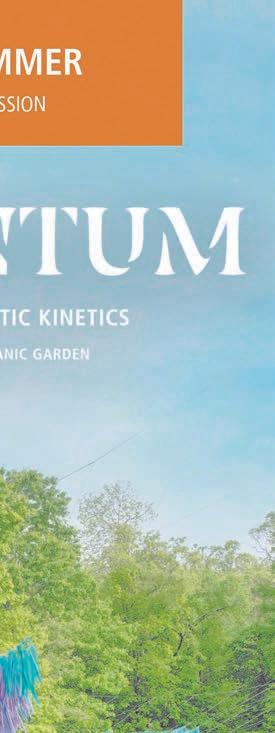









THU., MAY 29
5801 20th Anniversary Pride Weekend and Glitzburgh Pageant. 5 p.m. Continues through Mon., June 2. 5801 Video Lounge and Cafe. 5801 Ellsworth Ave., Shadyside. Free. facebook.com/5801VideoLounge/events
The Queer Dating Game with whiskey foxxx 6:30-11:30 p.m. The Glitterbox Theater. 210 West Eighth Ave., Homestead. $23.18108.55. eventbrite.com/o/rae-sunshine










Desert Hearts Queer Country Night. 8 p.m. Belvedere’s Ultra-Dive. 4016 Butler St., Lawrenceville. $5. belvederesultradive.com
Dyke Mic with Steel Carabiner 10 p.m. Blue Moon Bar. 5115 Butler St., Lawrenceville. Free. instagram.com/steelcarabiner


All Out Music Festival Pittsburgh. 2 p.m. Stage AE. 400 North Shore Dr., North Shore. $67.17-124.83. alloutmusicfest.com/music-festival-pittsburgh
Splish Splash Pride Party and Queer Craft Market 4-11 p.m. Under the 40th Street Bridge, Lawrenceville. $15-30 sliding scale. instagram.com/uhauldisco
Light the Night Pittsburgh Pride Prom 6-10 p.m. Courtyard by Marriott Pittsburgh University Center. 100 Lytton Ave., Oakland. Tickets start at $70. pittsburghpride.com
iCandy Pittsburgh presents Pride Disco. 7-11 p.m. Velum Fermentation. 2120 Jane St., South Side. $10. velumfermentation.com/events
Pittsburgh Pride Emerald City Kiki Ball. 10 p.m. QMNTY Center. 525 E. Ohio St., North Side. facebook.com/O icialPittsburghPride





THUR., MAY 29
















FRI., MAY 30



SPORTS • SWISSVALE
Gloves and Glitter Drag Softball Game with Steel City Softball League. 12 p.m. Les Getz Memorial Park. One Les Getz Dr., Swissvale. $10 in advance, $15 at the gate. sickening.events/e/gloves-and-glitter
PARADE • NORTH SIDE
Pittsburgh Pride Bigger Gayer Picniq. 1-7 p.m. Allegheny Commons West Park. 810 Arch St., North Side. Tickets start at $15. 18 and over. pittsburghpride.com

PARTY • BLOOMFIELD
Pittsburgh Pride Weekend Cherry Bomb Day Party 3-9 p.m.
Trace Brewing. 4312 Main St., Bloomfield. Free. instagram.com/mostbeautifullest
MUSIC • NORTH SIDE
Pittsburgh Pride Concert with David Archuleta. 7 p.m.
Allegheny Commons Park West, North Side. Free. pittsburghpride.com



PARADE • STRIP DISTRICT


Pittsburgh Pride March and Parade. 10 a.m. Parade at 12 p.m. Continues through Sun., June 1. Corner of Liberty Avenue and 11th Street, Strip District. Free. pittsburghpride.com


Pride Drag Brunch with Valentina 2 p.m. Doors 12:30 p.m. Pittsburgh Improv. 166 East Bridge St., Homestead. $37.17-119.88. improv.com/pittsburgh

PARTY • STATION SQUARE
Honcho Pride Boat with Stacy Christine and HUNY XO. 6 p.m.-12 a.m. Gateway Clipper Fleet. 350 W. Station Square Dr., Station Square. $49.05. linktr.ee/honchopgh
TEENS • MULTIPLE LOCATIONS



The Carnegie Library of Pittsburgh celebrates Pride Month with Teen Time workshops about influential LGBTQ creatives. Young patrons can make scrunchies and bandanas inspired by Pittsburgh Broadway and fashion icon Billy Porter, compose beats in honor of trans electronic music pioneer Wendy Carlos, and create art while learning about queer painter Marsden Hartley. Check the CLP website for times and branch locations. Continues through Thu., June 26. Free to teenage CLP cardholders. carnegielibrary.org/events


SPORTS • NORTH SHORE
Pittsburgh Pirates Pride Night 6:40 p.m. PNC Park. 115 Federal St., North Shore. Tickets start at $38.48-130.07. mlb.com/pirates

LIT • VIRTUAL
White Whale Bookstore presents meTamorphosis x W.J. Lofton with Dior J. Stephens. 7-8 p.m. Livestream only. Free. whitewhalebookstore.com/events
MARCH • TBA
Pittsburgh Dyke March and After-Party. 6 p.m. Details TBA. instagram.com/pghdykemarch







LGBTQ talent from the Greater Pittsburgh region and beyond gather for a good cause during the second-annual Loud and Proud Music Festival. The outdoor event at Allegheny City Brewing boasts live musical acts, vendor booths selling art and handmade goods, and more. The festival serves as a fundraiser for the Hugh Lane Wellness Foundation, a Pittsburgh-based health nonprofit focused on LGBTQ and HIV+ communities. 12-8 p.m. 510 E. Ohio St., North Side. $12 in advance, $15 at the door. tra ord.estate






















more. The Friday kick-o includes a Small Business Crawl and party at New Amsterdam, followed on Saturday by a main festival with an appearance by RuPaul’s Drag Race contestant Alaska Thunderfuck. On Sunday, head to Attack Theatre for the Mx. Lawrenceville Pageant. 4-10 p.m. Continues through Sun., June 15. Free. $10-25 for the Mx. Lawrenceville Pageant. lvpgh.com/pride-2025
PARTY • NORTH SIDE
21+ Pride Night: Lavender Labcoats 6-10 p.m. Carnegie Science Center. One Allegheny Ave., North Side. $20-25. carnegiesciencecenter.org
FESTIVAL • MT. LEBANON

Lebo Pride Celebration 10 a.m.-4 p.m. Mt. Lebanon Main Park, Mt. Lebanon. Free. All ages. RSVP required. lebopride.org

FESTIVAL • MILLVALE
Pride Millvale 12-6 p.m. Multiple locations, Millvale. Free. All ages. pridemillvale.org

PHOTO: XAVIER GUERRA/WORLD OF WONDER/PARAMOUNT+
Lydia B Kollins at All Out Music Festival

FESTIVAL • VANDERGRIFT
Vandergrift Pride in the Park. 12-6 p.m. Kennedy Park. Jackson Ave., Vandergrift. Free. All ages. vanderpride.org
PROM • NORTH SIDE
LGBTQ+ Youth Prom: We Exist – A Cryptid Convening. 6-10 p.m. The Andy Warhol Museum. 117 Sandusky St., North Side. Free. Registration required. Ages 13-18 only. warhol.org/events
FILM • DOWNTOWN
(pride/prom) Film Screening. 6 p.m. Doors at 5:30 p.m. The Andy Warhol Museum. 117 Sandusky St., North Side. Free. Registration required. warhol.org/events
CRAFTS • GARFIELD
Queer Craft Night: Afrofuturism. 7-9 p.m. Assemble. 4824 Penn Ave., Garfield. 18 and over. $12.16-$22.53, free for Garfield residents. Registration required. assemblepgh.org
SAT., JUNE 21
FESTIVAL • ALLENTOWN
Lavender Lux: A Community Pride Festival. 1 p.m. Bottlerocket Social Hall. 1226 Arlington Ave., Allentown. Free. RSVP required. bottlerocketpgh.com
CRAFTS • OAKLAND
Create and Connect: Pride Flag Buttons 2-4 p.m. Carnegie Library of Pittsburgh Main. 4400 Forbes Ave., Oakland. Free to CLP cardholders. carnegielibrary.org
MUSIC • MILLVALE
PGH Pride in the Pit 3 p.m. Doors at 2 p.m. The Funhouse at Mr. Smalls. 400 Lincoln Ave., Millvale. $24.40 mrsmalls.com
CRAWL • SOUTH SIDE
Pittsburgh Pride Bar Crawl. 4-7 p.m. Multiple locations, South Side. $14.79. 21 and over. Registration required. pubcrawls.com/city/pittsburgh-pa
FESTIVAL • ROSS TOWNSHIP
Ross Pride. 1-4 p.m. Ross Township Community Center. 1000 Ross Municipal Dr., Ross Township. Free. All ages. Search “Ross Pride” on Facebook
TUE., JUNE 10
LIT • BLOOMFIELD
Book Launch: Backhanded Compliments with author Katie Chandler and Amanda Quain. 7-8 p.m. White Whale Bookstore. 4754 Liberty Ave., Bloomfield. Free. Livestream available. whitewhalebookstore.com/events
THU., JUNE 12
COMEDY • HOMESTEAD
Two Dykes and a Mic: Going Hog Wild 7 p.m. Doors at 5:30 p.m. Pittsburgh Improv. 166 East Bridge St., Homestead. $31.14-124.74. improv.com/pittsburgh
FRI., JUNE 13
FESTIVAL • LAWRENCEVILLE
Lawrenceville Pride promises a weekend of shopping, live entertainment, pageantry, and
SUN., JUNE 15
MARKET • HIGHLAND PARK
Queer Craft Market. 4-8 p.m. Union Project. 801 N. Negley Ave., Highland Park. Free. instagram.com/queercraftmarket
THU.,
COMEDY • DOWNTOWN
Got Rights? Open Mic 9 p.m. Arcade Comedy Theater. 943 Liberty Ave., Downtown. $5. arcadecomedytheater.com
SUN., JUNE 22
PARTY • GARFIELD
Dry Pride 1-8 p.m. Two Frays Brewery. 5113 Penn Ave., Garfield. Free. twofraysbrewery.com




LGBTQ+ Youth Prom: We Exist - A Cryptid Convening at The
FESTIVAL • GREENFIELD
Greenfield Pride Night 5-8 p.m. Magee Rec Center and Complex. 745 Greenfield Ave., Greenfield. Free. All ages. greenfieldpridenight. com
THU., JUNE 26
COMEDY • HOMESTEAD
ALOK 7 p.m. and 9:30 p.m. Pittsburgh Improv. 166 East Bridge St., Homestead. $31.14-101.65 improv.com/pittsburgh
FRI., JUNE 27
DRAG • MILLVALE
Support your local drag performer at Harold’s Haunt. Presented by Coven of Misfits, Hail to the Kings promises a night of performances by Jaxafroot, Malacunt Lafoole, and hosts A Man Named Sara and Maxxx Massacre. You’ve seen the queens, now let the kings rule during this Pride Month event. Don’t forget tip money for the talent. 8 p.m. Doors at 7 p.m. 142 Grant Ave., Millvale. $15. instagram.com/covenofmisfits412
FESTIVAL • BELLEVUE
Bellevue Pride. 2-6 p.m. Bayne Park. 34 North Balph Ave., Bellevue. Free. All ages. bellevuepapride.org
FESTIVAL • DORMONT
Dormont Pride in the Park: Big Gay Wedding 1-8 p.m. Dormont Park, Dormont. Free. All ages. dormontcdc.org/pride2025
FESTIVAL • ASPINWALL
Pride in the Park. 3-7 p.m. Allegheny RiverTrail Park. 285 River Ave., Aspinwall. Free. All ages. fcprideinthepark.com




FESTIVAL • BELLEVUE
Forest Hills Pride 4-9 p.m. Westinghouse Lodge. 799 Barclay Ave., Forest Hills. Free. All ages. foresthillspride.org
GAME SHOW • STRIP DISTRICT
Wheel of Drag 7:30 p.m. Doors at 6 p.m. City Winery Pittsburgh. 1627 Smallman St., Strip District. $25-30. citywinery.com/pittsburgh




Buying old watches, broken or not, custom jewelry, coins, old silverware, gris walls pans, Call Mark 814-520-5670
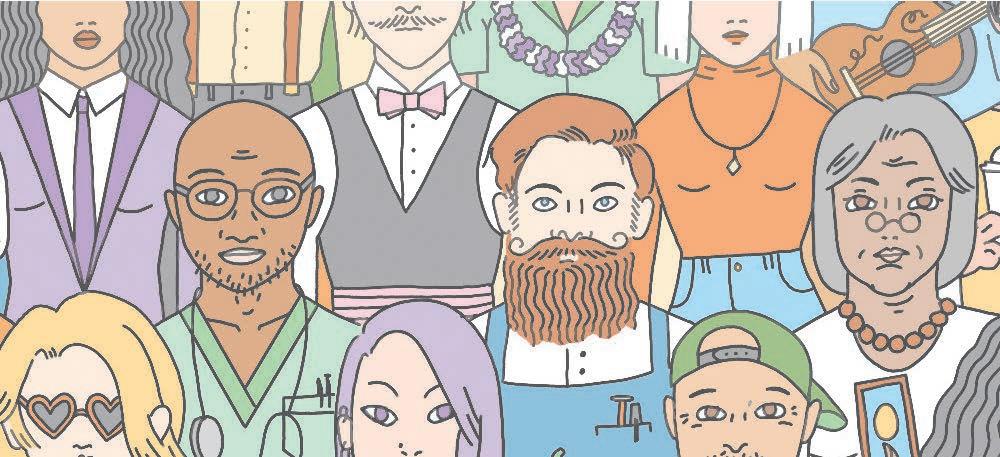






SAVE BIG on HOME
Compare 20 A-rated insurances companies. Get a quote within minutes. Average savings of $444/year! Call 844712-6153! (M-F 8am-8pm Central) (AAN CAN)
Need Help with Family Law?
Can’t Afford a $5000 Retainer?
Low Cost Legal Services- Pay As
You Go- As low as $750-$1500Get Legal Help Now! Call 1-844-821-8249 Mon-Fri 7am to 4pm PCT (AAN CAN)
https://www.familycourtdirect. com/?network=1


Many Americans are fortunate to have dental coverage for their entire working life, throughemployer-provided benefits. When those benefits end with retirement, paying dental bills out-of-pocket can come as a shock, leading people to put off or even go without care.
Simply put — without dental insurance, there may be an important gap in your healthcare coverage.
Look for coverage that helps pay for major services. Some plans may limit the number of procedures — or pay for preventive care only.
Look for coverage with no deductibles. Some plans may require you to pay hundreds out of pocket before benefits are paid.
Shop for coverage with no annual maximum on cash benefits. Some plans have annual maximums of $1,000.
Medicare doesn’t pay for dental care.1
That’s right. As good as Medicare is, it was never meant to cover everything. That means if you want protection, you need to purchase individual insurance.
Early detection can prevent small problems from becoming expensive ones. The best way to prevent large dental bills is preventive care. The American Dental Association recommends checkups twice a year.
Previous dental work can wear out.
Even if you’ve had quality dental work in the past, you shouldn’t take your dental health for granted. In fact, your odds of having a dental problem only go up as you age.2
Treatment is expensive — especially the services people over 50 often need.
Consider these national average costs of treatment ... $222 for a checkup ... $190 for a filling ... $1,213 for a crown.3 Unexpected bills like this can be a real burden, especially if you’re on a fixed income.
BY BRENDAN EMMETT QUIGLEY // BRENDANEMMETTQUIGLEY.COM
“Absolutely love”
“I absolutely love my dental insurance. My dental office files the claims, leaving me with very little balance to pay.” Dorothy P., TN
1. Hole-making devices
5. Deep sleep
9. Strong winds
13. What a cobbler cobbles
14. “Impression Sunrise” painter Claude
15. Drug dosed on blotters
16. It’s a long story
17. R-Rated
18. ___ Federal Credit Union
19. Most fresh songs from yesteryear?
22. Geological stretch
23. Cheerful word?
24. Most verbose small studio films?
32. “Catch you on the flip”
33. Darling alternative
45. Christmas decoration
46. Network slowdown
47. Most happy skateboard tricks?
55. Locale
56. Garbage ship
57. Creature that can jump ten times its height
59. Left
60. Decorate
61. All cleaned up
62. Not good, but not bad
63. Music producer Angélil
64. Phishing email, e.g.
1. Peach emoji, e.g.
2. Hitting sound
3. Tux the penguin, to Lunix
4. Made air tight
treat a ___!”
24. Seeing
25. Mosque leaders
26. ___ McCorvey (“Roe” of “Roe v. Wade”)
27. It may be thrown in contempt
28. Some reusable bags
29. Inactive
30. Fragrant resin used in incense
31. “Yes ___!” (“You betcha”)
35. Not as much
37. Magnet strip hanging on a kitchen wall
38. Fart spray and Groucho glasses, for two
40. Aptly-named
citrus fruit
41. Equal in Paris (and an anagram of 9-Across)
43. Trattoria treat
44. Actor Covert of the Happy Gilmore films
47. Spielberg film set in Amity Island
48. Ice cream flavor
49. Optical sensor part
50. “Smooth
LAST WEEK’S ANSWERS



34. Diminutive in many a rap name
36. Tent covering
37. Sagal of Futurama
38. Richard of I’m Not There
39. “That’s a good question ...”
40. Gambler’s wager
41. Chair named for its designers
42. Most baggy farming students?
5. Programmer’s work
6. Di icult problem
7. Messy sandwich
8. Contract writer 9. World leader on the rupee 10. Berry in some poke bowls 11. Exist 12. Breyers rival
Augusta’s home 20. “What are you waiting for?” 21. “That’s no way to
